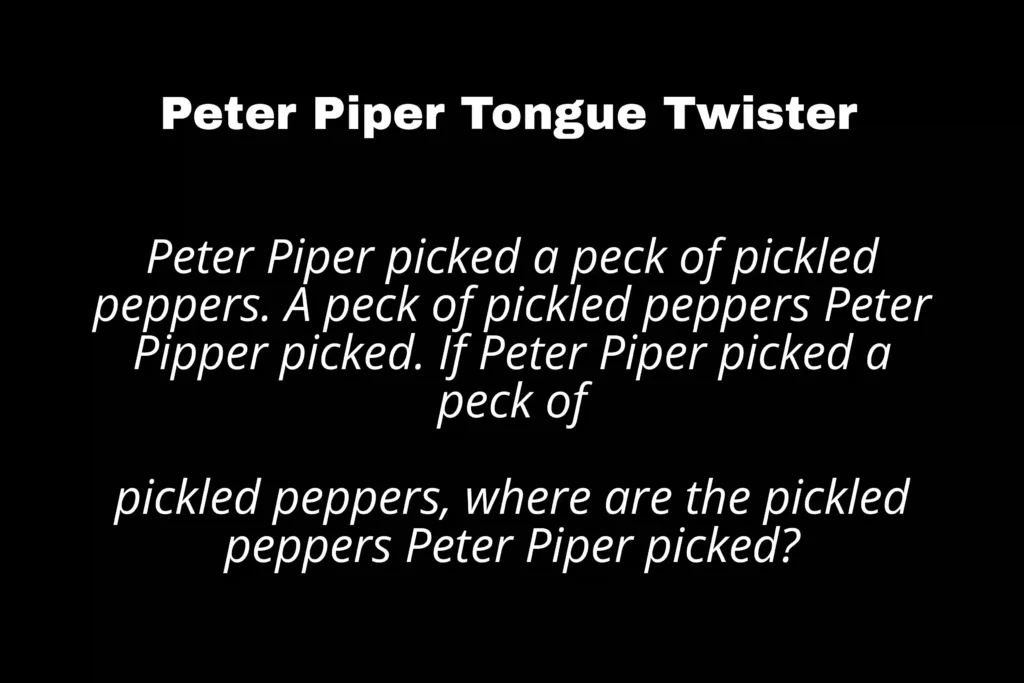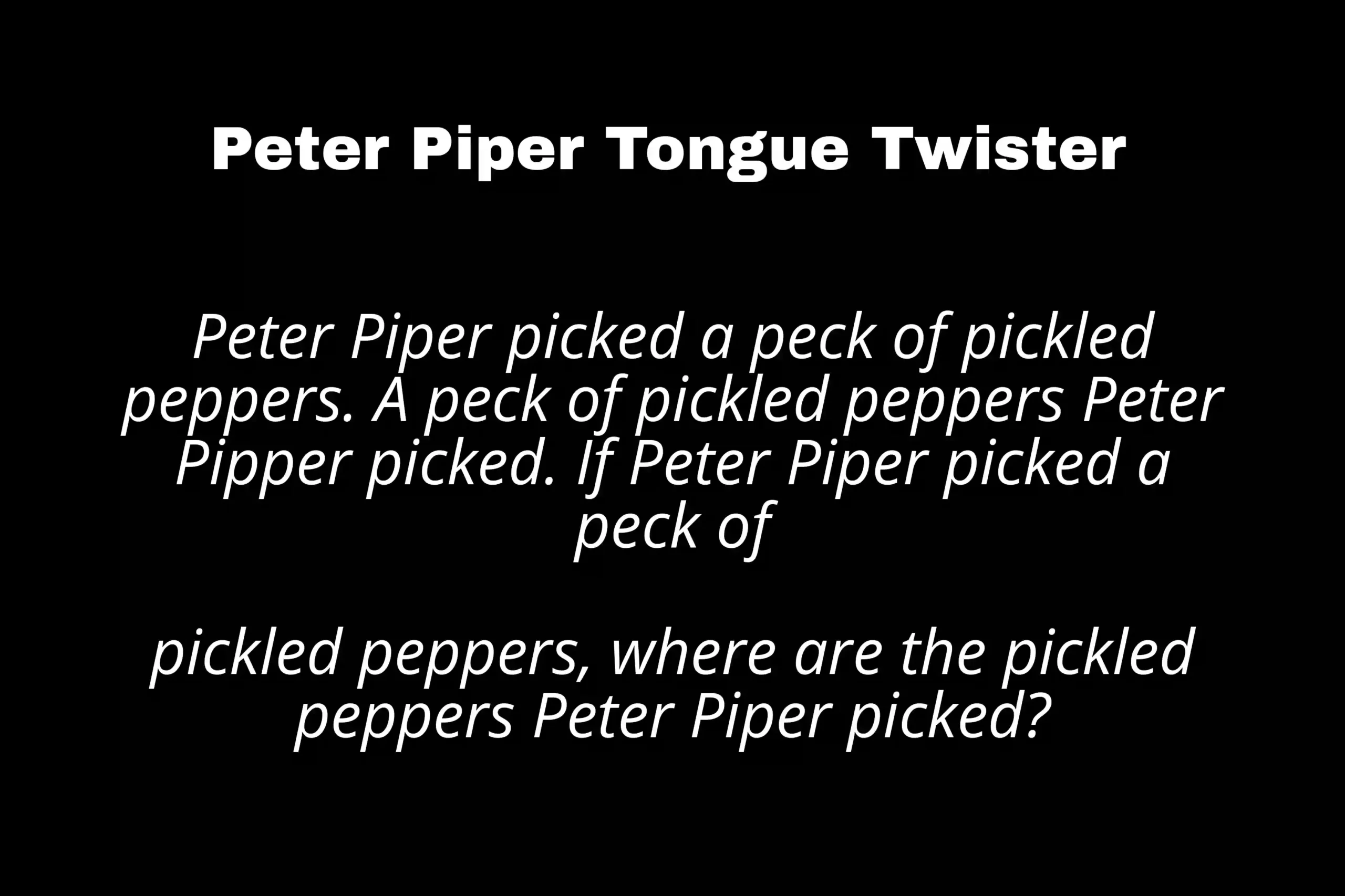The Peter Piper tongue twister is a well-known phrase that has challenged language enthusiasts and entertained people of all ages for generations. In this article, we’ll explore the origins of this tongue twister, its linguistic complexity, and the fun it brings to both children and adults.
The Origin of the Peter Piper Tongue Twister
The Peter Piper tongue twister has a rich history that dates back to the 18th century. It was first recorded in the early 19th century in England and has since become a popular phrase used to test one’s pronunciation skills. The tongue twister gained further popularity through its inclusion in the famous children’s book “Peter Piper’s Practical Principles of Plain and Perfect Pronunciation.”

Deconstructing the Tongue Twister
Let’s break down the tongue twister:
Peter Piper picked a peck of pickled peppers.
This opening line introduces us to Peter Piper and his peculiar peck of pickled peppers. The repetition of the ‘p’ sound creates a challenging articulation exercise.
How many pickled peppers did Peter Piper pick?
This question adds complexity by forcing the speaker to switch from the ‘p’ sound to the ‘k’ sound swiftly.
If Peter Piper picked a peck of pickled peppers, where’s the peck of pickled peppers Peter Piper picked?
This line is the real tongue twister. It combines alliteration with a complex sentence structure, making it a true linguistic challenge.
The Benefits of Tongue Twisters
Tongue twisters like Peter Piper’s offer more than just linguistic amusement. They provide several cognitive and educational benefits:
1. Improved Pronunciation
Repeatedly practicing tongue twisters can enhance your pronunciation and articulation skills. It forces you to enunciate clearly and master challenging sounds.
2. Enhanced Speech Fluency
Tongue twisters help improve speech fluency by promoting smoother transitions between sounds and words. This can boost your overall communication skills.
3. Cognitive Workout
Reciting tongue twisters is like a mental workout. It enhances memory, concentration, and cognitive flexibility as you navigate intricate phrases.
4. Fun Learning Tool
For educators and parents, tongue twisters are a fun way to teach children about language and phonetics. They make learning engaging and memorable.
Trying Your Hand at Peter Piper
Now that you know the benefits of tongue twisters, it’s time to give Peter Piper a try. Start slowly, and as you gain confidence, increase your speed. Remember, practice makes perfect!
Tips for Mastering Peter Piper Tongue Twister
1. Slow and Steady
Begin at a slow pace to get comfortable with the sounds. Gradually increase your speed as you become more proficient.
2. Record Yourself
Recording your attempts allows you to hear your progress and identify areas for improvement.
3. Practice Regularly
Consistent practice is key to mastering tongue twisters. Dedicate a few minutes each day to hone your skills.
4. Challenge Yourself
Once you’ve mastered Peter Piper, explore other tongue twisters with different sounds and patterns to further enhance your linguistic prowess.
Conclusion
The Peter Piper tongue twister is more than just a playful phrase—it’s a valuable tool for improving pronunciation, speech fluency, and cognitive skills. So, the next time you’re looking for a fun linguistic challenge, give Peter Piper a try and enjoy the benefits it brings to your language skills.
FAQs
Q1: Who created the Peter Piper tongue twister?
The origin of the tongue twister is unclear, but it gained popularity through its inclusion in the book “Peter Piper’s Practical Principles of Plain and Perfect Pronunciation.”
Q2: Are there other famous tongue twisters like Peter Piper?
Yes, there are many famous tongue twisters, such as “She sells seashells by the seashore” and “How can a clam cram in a clean cream can?”
Q3: Can tongue twisters help with foreign language learning?
Yes, practicing tongue twisters can improve your pronunciation and articulation in foreign languages as well.
Q4: Are there tongue twister competitions?
Yes, some competitions challenge participants to recite tongue twisters accurately and quickly, showcasing their linguistic skills.
Q5: Are tongue twisters suitable for all age groups?
Absolutely! Tongue twisters provide linguistic fun for people of all ages, from children learning to speak to adults looking to refine their pronunciation and fluency.







1 thought on “Peter Piper Tongue Twister: A Playful Exercise for Language Enthusiasts”